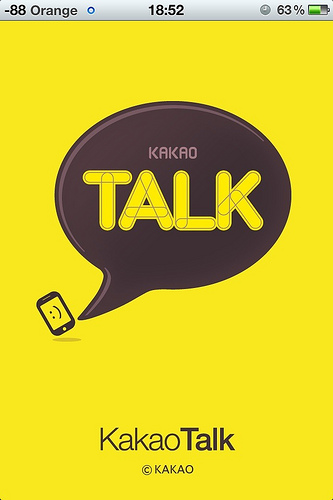Net neutrality [1] is an Internet network principle that blocks Internet service providers or governments from restricting consumers’ access to networks and discriminating against traffic from different contents and sites. However, by the advance of mobile broadband networks, this principle has been challenged in many parts of the world and demand for new traffic management rules have grown ever stronger. One of the most wired countries in the world, South Korea, is in the midst of a heated debate on net neutrality– an issue which will greatly affect the future of the Internet.
On June 4, 2012, ‘Voice Talk’, a new Korean mVoIP [2] (mobile VoIP) was released in the Korean domestic mobile market. This service was developed by Korean start-up KaKao which operates the nation's most popular mobile messenger application named ‘Kakao Talk’ [3]. Subsequently, Korean telecommunication companies, including Korea Telecom [4] (KT) and SK Telecom [5], launched attacks on Voice Talk, claiming that it will substantially degrade the quality of their data network services. They even said that this new innovation will not only threaten their telecommunication infrastructure but the public interest. Conflict between these telecommunication companies and internet companies led to government intervention.
The Korea Communications Commission(KCC) announced on July 13, 2012 that the authorities have come up with a basic guideline for reasonable network management. However, this new rule would allow Korean telcos to discriminate against not only mVoIP, such as Voice Talk, but also Peer to Peer (P2P) technology that has been widely used in South Korea for online broadcasting and downloading software patches. The government's decision started an uproar in South Korean online space. Especially in some communities where people shared their distaste for the government imposing a set of guidelines to quell the conflicts, it was easy to find people holding grudges.
For example, Twitterer @goodhyun [7] who is a former MS employee and a tech writer, lamented [8] [ko] that the government decision would narrow future debates on the Internet governance in a wrong way.
망중립성 논의는 거시경제학적 함의가 풍성해 이 사회가 더 튼튼한 제도 설계를 할 수 있게 만드는 좋은 소재입니다. 그러나 방통위께서 저렇게 스스로 전지전능한 듯 종결자 노릇을 해 주시니 논의는 이제 아마 감정적으로 치닫겠지요.
Others are concerned about the decision's impact on innovation and basic civic rights in South Korea. Twitter user @rushtenm [9] criticized [9] [ko] the government for lack of concern about the decision's ramifications for the prospect of innovation.
망중립성을 지켜줘야할 정부가 나서서 통신사 편을 들어주는 한쿡. 이러면서 또 3년 후에 우리나라에는 외국의 혁신적인 서비스가 없다고 징징거리겠지…. ㅉㅉ
Another Twitter @soventure [10], a social entrepreneur, writes [11] [ko] that the decision should have been made more carefully as it would reshape free expression online:
농담처럼 이야기하고 있지만..하도 기막혀서 그런것이구요. 망중립성은 정말 중요합니다. 앞으로 컨텐츠벤처의 경쟁력을 다 깎아먹을 수 있는 문제도 있고.. 더 크게는 표현의 자유가 제한되는 문제도 있죠..
@woohyung, [12] a South Korean Internet expert residing in the U.S., blames [13] [ko] the Korean government for its incompetence in terms of making Information Communication Technology (ICT) policy:
미국규제에선 21C 보편적서비스 개편방향이 최대 관건 중 하나 망중립성포함해 유무선망통합/IP서비스통합/신기술혁신/커뮤니티브로드밴드등이 관련된 주요정책요소들. 한국규제기관은 전문성/역량 다 부족하면서 인터넷강국 마케팅에 스스로 빠져 매우 오만하다 생각
In order to raise public concerns about this policy debate and represent citizens’ voices in the decision-making process, Citizens’ Coalition for Economic Justice [14], Open Web [15], The Internet is ours [16], Jinbo.net [17], People Power [18], Womenlink Media Activism Center [19], Citizens’ Action Network [20], and the other civic-minded organizations formed the Network Neutrality Forum [21] on May 2, 2012. So far, they have hosted two open seminars on net neutrality for journalists on June 13 [22] and July 3 [23].
